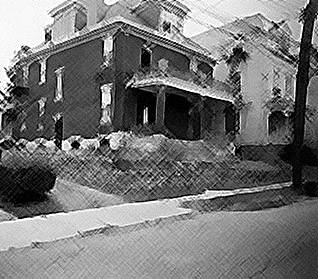


Dateline: June 10 1998 1:20 AM 2323 Stratford, Cincinnati, Ohio A storm raged outside, preventing us from working on the hypertext, due to our fears that the lightning would cause the computer to crash and ruin the whole damn thing. We’d put in, what, about 12 hours at this point and didn’t want to risk it. The interview/conversation/symposium was originally intended for broadcast on WEFT Radio/Champaign, but was never broadcast, due to multiple breaches of FCC regulations. S: I think maybe we should take a little time to explain what we have in mind with the Unknown Anthology. W: I think it would be good for the radio listeners to hear some people brainstorming about their hypertext. S: Ah. W: Because they’ll never hear that on radio, anywhere else. S: It’s certainly a new genre. D: But we gotta watch our language. This is not recording right now, is it? S: Yes. W: Also, really direct references to ourselves, I think we should just agree to rule out—and just talk about the project. S: Yes. D: Alright, well, I have a word about the project. I don’t like the fact that we’re calling it "the Unknown Anthology.” I think that the book should just be The Unknown—period— S: The Unknown. D: I mean, it should be broad. And if there’s a subtitle, you can say an anthology of blah blah blah. S: I only say the Unknown Anthology because it’s an anthology of the Unknown. W: Oh that project. I thought we were talking about the other project. D: Well, what other project are we talking about? W: Well there’s the hypertext, then there’s the Unknown anthology, which is the book that we wrote, and the only reason we wrote that is so that we could write the book that we haven’t written yet, the Unknown—eh that’s titled— D: Criticism of the Unknown. S: Or is it A Critical Response to the Unknown? D: [With Indignation] No. S: I mean because that’s what it would be; a critical response. D: Yes, I realize that, but criticism has more meanings than critical response. Criticism can mean—pointing your finger at the Unknown and going “BAD UNKNOWN, BAD!” S: [Laughing] I know, but we don’t wanna do that—I mean— D: Yes we do! We want to be multivaried and silly because partially this is a silly project— S: Well, yeah, in origin, but— D: In origin— W: Which project? S: The Unknown. W: Okay, yeah, that one’s silly. D: The Criticism of the Unknown. W: No, that one’s serious— D: I mean if you say “A Critical Response to the Unknown,” already you’re setting yourself up for academic bullshit. “A Critical Response to the Unknown,” it sounds like— S: Can you say bullshit on the radio? W: You can’t say bullshit on the radio. And we don’t even want it—so why say it? S: Yeah. Don’t say bullshit. W: It’s an eight letter word. Those are—evil. S: Oh, they’re legal? W: No, I didn’t, I’m just— D: No, it’s a legal hassle. You can’t— S: You can’t say bu... D: The FCC is— S: So why don’t we back up little, cause that’s gonna get edited out. So why don’t we say, “This is B.S.” W: Sure, we can do that. S: Because B.S. is, uh—you can say B.S. on the radio. W: What are we talking about? S: We were talking about The Unknown. W: Oh, okay. S: The project, uh, this was your idea to begin with—wasn’t it, Dirk? [Thoughtful silence.] D: No. Was I?—well… S: Well, I guess it was sort of our idea, collectively. D: We were talking about how—well we were talking about William’s work. S: Oh yeah, and how there should be criticism. W: And at some point we said, I think to each other—I don’t remember who prompted first—that we could write criticism about that work—that it needed— S: And that it was like looking for scholars, almost. I mean, it had that kind of brilliance. D: Right, exactly. It was work that—part of his attention, his focus on attracting the type of audience necessary to make it undergo—critical examination. W: Wow. S: I think that there’s a need for that. Even if it wasn’t, ah, actually published. W: Cause it’s easier to write criticism about criticism than it is about literature, so if you have someone to ah, you know, start the criticism, then it’s easier to accept the literature into the group of literature that people have heard of. S: Yeah. It’s also fun to write essays about your friends’stuff. |
Transcript (1) 3:53 443K RealAudio Clip |
|
|
||||||
|
||||||
|
|